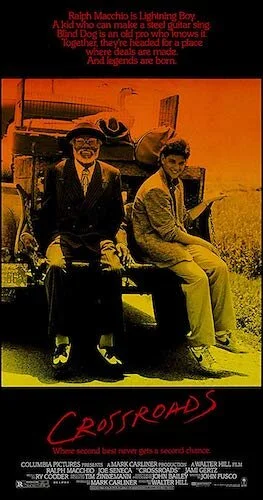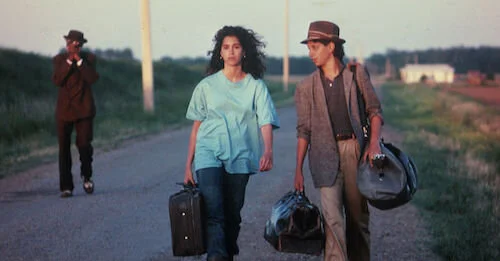Crossroads: On-This-Day Thursday
Every Thursday, an older film released on this opening weekend years ago will be reviewed. They can be classics, or simply popular films that happened to be released to the world on the same date.
For March 12th, we are going to have a look at Crossroads.
Crossroads is beyond a cult film by now. In the YouTube age, the film has received a new lease on life due to the climactic guitar battle between Eugene Martone (Ralph Macchio) and Jack Butler (the brilliant Steve Vai). At the heart of the film is a message about playing music for real, and not for corporate reasons. The notion of selling one’s soul to the devil for musical talent is a legend of old, and Crossroads is obsessed with this metaphor. If you’re a music fan, you may get something out of this film. It’s a bit heavy handed, and a little ostentatious in a kitschy way, but this was clearly made for a specific type of viewer: artists that suffer for their craft.
With that in mind, you have some additional downfalls. Having a slide — a metal pipe used by guitarists on their fingers to change the timbre of notes — be the major turning point for how Eugene gets ahead with his playing is a tad silly. That’s like having a formula racing film where a spoiler at the back of a car was the secret ingredient. A classical guitar player wouldn’t know of such a practice? Wouldn’t the ticket to playing the blues be to have something to say? Well, the film gets that right with Eugene’s woes, in the form of life, and of a girl (Frances). It’s typical, it’s conventional, but I think everyone wanting to watch this film signed up for this.
Eugene and Frances talking, as Willie Brown trails behind.
I also don’t know how I feel about the inclusion of real figures in such a strange, clearly fictional film, including blues legend Willie Brown (played by Joe Seneca). I mean, this is a film that involves the devil (the freaking devil) in a literal way. Having Robert Johnson be an influence to the film (and to lead character Eugene) is somewhat better. I do get how Crossroads is trying to tell a story in the same way blues tunes do, even in a figurative sense. It makes this whole real-person concept a bit easier to swallow. Either way, Crossroads is a tiny bit daring for such a safe film, but ultimately too comfortable to make any major statement, despite the potentials here.
Well, at least we’ll always have this.
Andreas Babiolakis has a Masters degree in Film and Photography Preservation and Collections management from Ryerson University, as well as a Bachelors degree in Cinema Studies from York University. His favourite times of year are the Criterion Collection flash sales and the annual Toronto International Film Festival.





